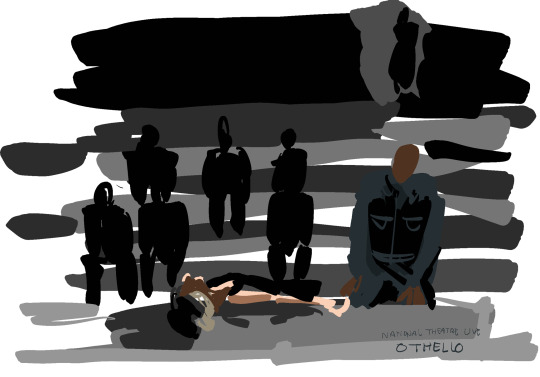#National Theatre Live: Othello
Text
National Theatre Live: Othello 見たよ

YouTubeで見たよ。
「システム」と呼ばれるバックに配置される俳優たちが、イアーゴの悪意やオセロの嫉妬が吹き出す場面にいて、それが人間の感情を増長する役割を表していた。嫉妬や差別感情は個人的な感情であると同時に、社会的なシステムと繋がると憎悪が増長していくことを思わせる。衣装がなんとなくナチスの親衛隊ぽいなと連想してしまった。
オセロを今まで一度も見たことはなかったが、オセロといえば嫉妬、とは私でも知っているように、演出としてもその点は存分に嫉妬の怖さを感じさせられた。演出家の意図としては黒人差別と女性への暴力がテーマだったと話に聞いたが、その点でも解釈できるシェイクスピアはやっぱりすごい。
差別の連鎖というか、陥れられたオセローが追い詰めていくのは、社会の中でも従順さを押し付けられる立場の女性で、その女性を知らずに窮地に追い込んでしまうのもまた、ドメスティックバイオレンスを日常的に受けているエミリアであるのも悲しい。エミリアは自分が拾ったハンカチのために、敬愛するデズデモーナを死に追いやったのだと気づき慟哭する場面が圧巻だった。
気高いオセローが嫉妬に駆られていくさまを演じきったジャイルズ・テレラさん良かった。この人はハミルトンのバーを演じた人だけど、それも見たいよね〜。
2 notes
·
View notes
Text

signal boost!! (link)
#I saw it when it came out in theatres well worth the watch#othello#shakespeare#theatre#national theatre#national theatre live
1K notes
·
View notes
Text
Othello | Watch for Free | National Theatre at Home | Full Performance
youtube
Friendsfriendsfriendsfriends the National Theatre Live program has Othello streaming for FREE until November and it is SO GOOD. It's 2 and a half hours so make it a night. The set? Awesome. The direction? Superb. The performances? Holy fuck. I'm obsessed with Desdemona now. Watch iiittttt
7 notes
·
View notes
Text
i don't know if i should be asking this but i'm desperate...... has anyone downloaded the national theatre othello video from youtube?? I NEED TO EDIT IT

#that production was so insane#truly beautiful#i didn't know they were deleting it from youtube 😭#damn#i'll probably delete this later#othello 2023#othello#othello 2022#national theatre live#shakespeare#national theatre
3 notes
·
View notes
Text


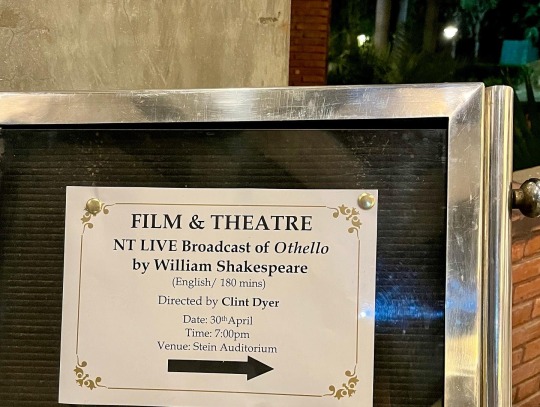

30 Apr 2023
Desdemona
#othello#Shakespeare#clint dyer#national theatre#london#new delhi#desdemona#emilia#national theatre live#theatre#film#books#evening#cassio#iago#Giles Terera#rosy mcewen
3 notes
·
View notes
Text
youtube
Othello, in which Iago is such a Hater.
Giles Terera (Othello) and Company act their asses off in this compelling production from December 2022.
(BTW, Mr. Terera was awarded the 2018 Olivier Award for Best Actor in a Musical for the role of Aaron Burr in the West End production of HAMILTON. Yep. Triple F’in’ Threat.)
#othello#william shakespeare#national theatre#live theater#national theatre at home#Youtube#fundraiser#live theatre matters
1 note
·
View note
Text
Othello, National Theatre (2013)
We're not here to talk about my state-instilled Pavlovian response (negative) to Shakespeare. We're here to talk about the one Valid Man in this play: Montano.
I don't need to walk it through, you all know the plot, don't you?
Don't you?
Go check it, I'll wait.
This is a great production, with Adrian Lester (of Hustle swag) as Othello, Rory Kinnear as Iago (yes, he of the Badmingtons from OFMD, playing bad guy bingo) and my BELOVED Lady Sarah from Garrow's Law (forever faves), Lyndsey Marshal as Emilia. I say it's great, though it is a modern setting (military) and....really brought home to me how much I don't think this play adapts to a modern setting at all. Not so much for the racial tension, but for the balance of power between the genders. Anyway sorry yes, we're really not here to talk about that. And the modern setting does mean we are blessed with a slutty t-shirt I have no doubt you'll all adore.




Man of many hats!
Montano was commander of the Venetian army in Cyprus and they were having a Bad Old Time against the Ottomans (yeah, modern setting, I know, just...Shakespeare goggles or whatever). The Duke of Venice decided to relieve him and put Othello in charge instead - and Montano is happy for it! (cf. Iago's response to having his position 'usurped' when Cassio is promoted ahead of him)


I'm afraid the subs in that first image refer to Desdemona, Othello's wife, not Montano 😏
Anyhoo, Othello's arrival coincides with a storm that wrecks the Turkish fleet, and there is Much Celebration! Meanwhile, Iago has orchestrated a fight between Cassio and Rodriguo - knowing that if he can get Cassio drunk he won't be able to control his temper.
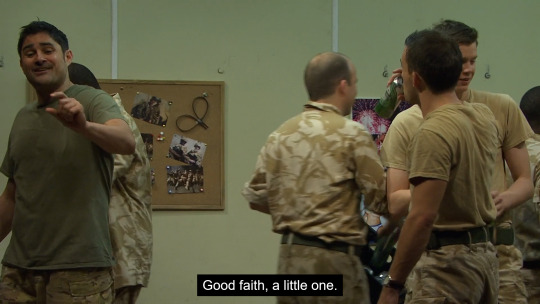


No one's going to out-do Montano in drinking Othello's health!

Yes, I made myself figure out an easy-ish way of giffing, finally. I'll take requests later if anyone has any for other scenes...
Montano (totally ignorant of Iago's plans) challenges Cassio to SHOTS SHOT SHOTS (per original script) to Othello's honour.


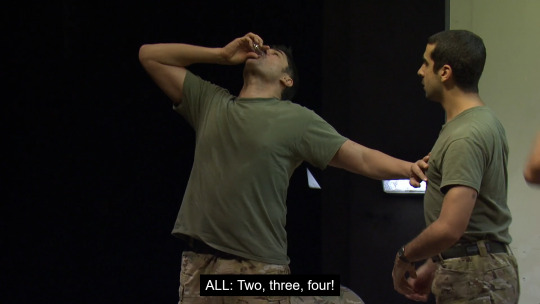
Best quality? Hims wiggles.


Cassio is getting uh. Angry. And goddy. He tries to get everyone to pray with him.

Iago has a brief chat alone with Montano to claim Cassio is like this all the time and make Montano worry that someone should warn Othello.


Iago's evidently angling for Montano to do so, but he doesn't really get the chance, as Rodriguo, having provoked Cassio as planned, comes running in pursued by Cassio and Montano tries to break it up.

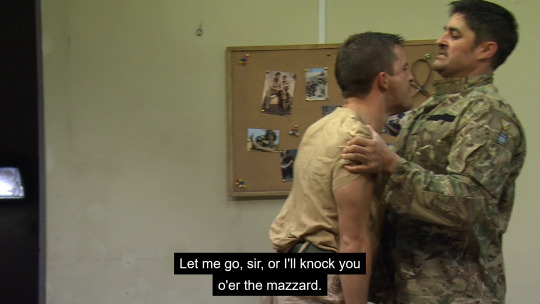

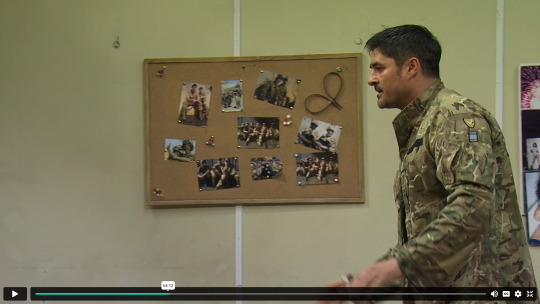

Cassio...really is an angry drunk. Who doesn't like Montano pointing out that he is drunk. An alarm is raised, a brawl breaks out, but Cassio really uh. Has it in for the big guy.

(who hasn't dreamed of climbing him like you're a big cat trying to bring down some kind of glorious ancient megafauna with your teeeth?)
Poor Montano. Bleeding profusely and Othello suggests he started the fight!


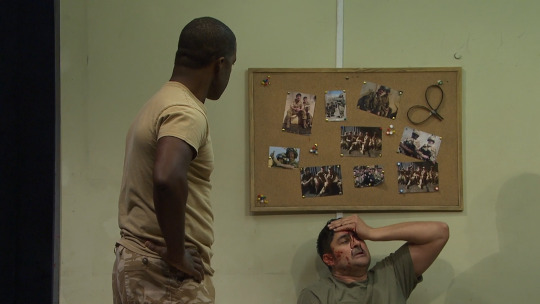

Whump fans, I have so many more stills and a little video clip - it will all be available when I'm done watching through the list, which will be very soon now :')
He has to go away and recuperate for a long time (a LONG time, this play is three hours long, which is very long when you already know how it’s going to end and it’s all just yes ok we know it’s a tragedy ok but where’s the goddamn catharsis???), but pops up again with his head taped up at the end. Mainly to stand around looking miserable while the Tragic Ending plays out, but he remains a good man, and that’s rare in this play.


The precise moment he realises Desdemona isn’t just...having a nap while they all argue (???)



Making sure Othello doesn’t get away, but also ready to...run unarmed after Iago. He gives the gun to Desdemona’s uncle and dashes off.

Brings back Iago, then disarms Othello (again)!


Striking a pose


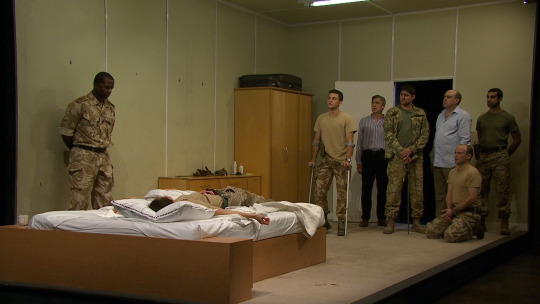
Curtain call!


---
Rating
Dead? Nope! A talent in a tragedy!
Evil? Not at all! The closest character I think I’ve seen him play to Brasso? And even more of a talent to live and not be evil in a tragedy!
Affects the plot? Yes - and the drinking contest isn’t pre-meditated, nor is his good-natured intervention in Cassio’s fight.
I find this play very long. I love a bit of foreshadowing and fated tragedy, but ever since I had to study this in school I found the ending a let-down after such plainly presented and inevitable misery. Montano is only in a couple of scenes relatively early and a couple at the end. They may be good scenes, and I may be able to see much of merit in the rest of the play, but it is a slog. Look at these screenshots though and tell me 3.5/5 isn’t fair, with the t-shirt gaining that extra .5 all by itself.
---
Bonus: some stills from the behind the scenes footage of choreography of the brawl. They’re a bit blurry and a lot are just.....his back. I apologise for nothing.
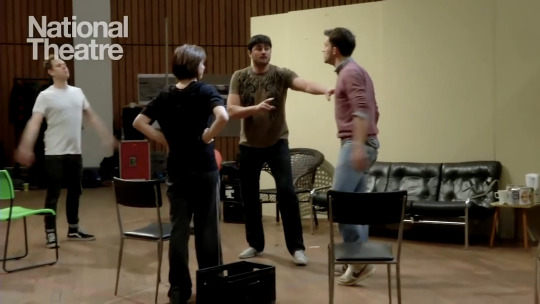

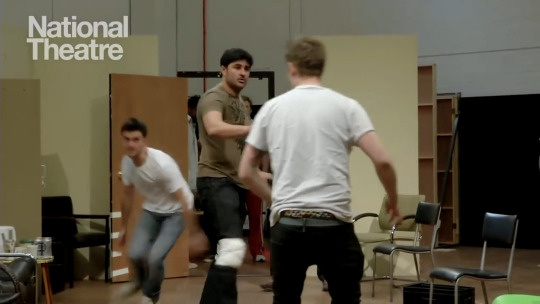
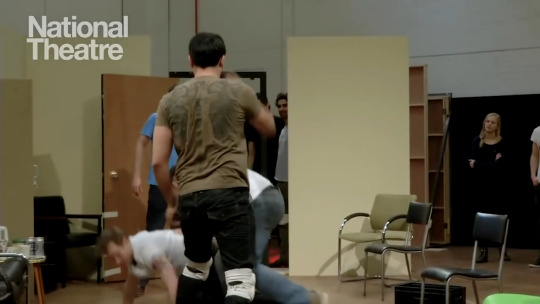

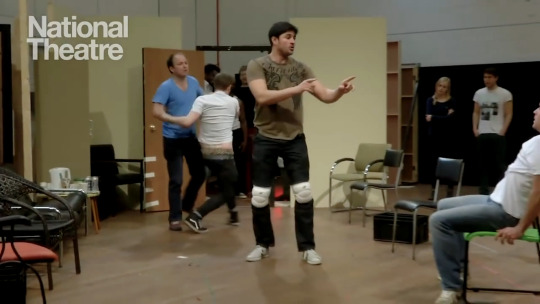
#adventures in joplin sibtain's imdb page#joplin sibtain#chook sibtain#othello#national theatre#ntathome#othello 2013
13 notes
·
View notes
Text

William Shakespeare, Shakespeare also spelled Shakspere, byname Bard of Avon or Swan of Avon, (baptized April 26, 1564, Stratford-upon-Avon, Warwickshire, England—died April 23, 1616, Stratford-upon-Avon), English poet, dramatist, and actor often called the English national poet and considered by many to be the greatest dramatist of all time.
Shakespeare occupies a position unique in world literature. Other poets, such as Homer and Dante, and novelists, such as Leo Tolstoy and Charles Dickens, have transcended national barriers, but no writer’s living reputation can compare to that of Shakespeare, whose plays, written in the late 16th and early 17th centuries for a small repertory theatre, are now performed and read more often and in more countries than ever before. The prophecy of his great contemporary, the poet and dramatist Ben Jonson, that Shakespeare “was not of an age, but for all time,” has been fulfilled.
William Shakespeare
Category: Arts & Culture
Baptized: April 26, 1564 Stratford-upon-Avon England
Died: April 23, 1616 Stratford-upon-Avon England
Notable Works: “A Midsummer Night’s Dream” “All’s Well That Ends Well” “Antony and Cleopatra” “As You Like It” “Coriolanus” “Cymbeline” First Folio “Hamlet” “Henry IV, Part 1” “Henry IV, Part 2” “Henry V” “Henry VI, Part 1” “Henry VI, Part 2” “Henry VI, Part 3” “Henry VIII” “Julius Caesar” “King John” “King Lear” “Love’s Labour’s Lost” “Macbeth” “Measure for Measure” “Much Ado About Nothing” “Othello” “Pericles” “Richard III” “The Comedy of Errors” “The Merchant of Venice” “The Merry Wives of Windsor” “The Taming of the Shrew” “The Tempest” “Timon of Athens”
Movement / Style: Jacobean age
Notable Family Members: spouse Anne Hathaway
It may be audacious even to attempt a definition of his greatness, but it is not so difficult to describe the gifts that enabled him to create imaginative visions of pathos and mirth that, whether read or witnessed in the theatre, fill the mind and linger there. He is a writer of great intellectual rapidity, perceptiveness, and poetic power. Other writers have had these qualities, but with Shakespeare the keenness of mind was applied not to abstruse or remote subjects but to human beings and their complete range of emotions and conflicts. Other writers have applied their keenness of mind in this way, but Shakespeare is astonishingly clever with words and images, so that his mental energy, when applied to intelligible human situations, finds full and memorable expression, convincing and imaginatively stimulating. As if this were not enough, the art form into which his creative energies went was not remote and bookish but involved the vivid stage impersonation of human beings, commanding sympathy and inviting vicarious participation. Thus, Shakespeare’s merits can survive translation into other languages and into cultures remote from that of Elizabethan England.
Shakespeare the man
Life
Although the amount of factual knowledge available about Shakespeare is surprisingly large for one of his station in life, many find it a little disappointing, for it is mostly gleaned from documents of an official character. Dates of baptisms, marriages, deaths, and burials; wills, conveyances, legal processes, and payments by the court—these are the dusty details. There are, however, many contemporary allusions to him as a writer, and these add a reasonable amount of flesh and blood to the biographical skeleton.
Shakespeare Reading, oil on canvas by William Page, 1873-74; in the collection of the Smithsonian American Museum of Art, Washington, D.C. (William Shakespeare)
Shakespeare's birthplace
The parish register of Holy Trinity Church in Stratford-upon-Avon, Warwickshire, shows that he was baptized there on April 26, 1564; his birthday is traditionally celebrated on April 23. His father, John Shakespeare, was a burgess of the borough, who in 1565 was chosen an alderman and in 1568 bailiff (the position corresponding to mayor, before the grant of a further charter to Stratford in 1664). He was engaged in various kinds of trade and appears to have suffered some fluctuations in prosperity. His wife, Mary Arden, of Wilmcote, Warwickshire, came from an ancient family and was the heiress to some land. (Given the somewhat rigid social distinctions of the 16th century, this marriage must have been a step up the social scale for John Shakespeare.)
Stratford enjoyed a grammar school of good quality, and the education there was free, the schoolmaster’s salary being paid by the borough. No lists of the pupils who were at the school in the 16th century have survived, but it would be absurd to suppose the bailiff of the town did not send his son there. The boy’s education would consist mostly of Latin studies—learning to read, write, and speak the language fairly well and studying some of the Classical historians, moralists, and poets. Shakespeare did not go on to the university, and indeed it is unlikely that the scholarly round of logic, rhetoric, and other studies then followed there would have interested him.
Instead, at age 18 he married. Where and exactly when are not known, but the episcopal registry at Worcester preserves a bond dated November 28, 1582, and executed by two yeomen of Stratford, named Sandells and Richardson, as a security to the bishop for the issue of a license for the marriage of William Shakespeare and “Anne Hathaway of Stratford,” upon the consent of her friends and upon once asking of the banns. (Anne died in 1623, seven years after Shakespeare. There is good evidence to associate her with a family of Hathaways who inhabited a beautiful farmhouse, now much visited, 2 miles [3.2 km] from Stratford.) The next date of interest is found in the records of the Stratford church, where a daughter, named Susanna, born to William Shakespeare, was baptized on May 26, 1583. On February 2, 1585, twins were baptized, Hamnet and Judith. (Hamnet, Shakespeare’s only son, died 11 years later.)
How Shakespeare spent the next eight years or so, until his name begins to appear in London theatre records, is not known. There are stories—given currency long after his death—of stealing deer and getting into trouble with a local magnate, Sir Thomas Lucy of Charlecote, near Stratford; of earning his living as a schoolmaster in the country; of going to London and gaining entry to the world of theatre by minding the horses of theatregoers. It has also been conjectured that Shakespeare spent some time as a member of a great household and that he was a soldier, perhaps in the Low Countries. In lieu of external evidence, such extrapolations about Shakespeare’s life have often been made from the internal “evidence” of his writings. But this method is unsatisfactory: one cannot conclude, for example, from his allusions to the law that Shakespeare was a lawyer, for he was clearly a writer who without difficulty could get whatever knowledge he needed for the composition of his plays.
Career in the theatre of William Shakespeare
The first reference to Shakespeare in the literary world of London comes in 1592, when a fellow dramatist, Robert Greene, declared in a pamphlet written on his deathbed:
There is an upstart crow, beautified with our feathers, that with his Tygers heart wrapt in a Players hide supposes he is as well able to bombast out a blank verse as the best of you; and, being an absolute Johannes Factotum, is in his own conceit the only Shake-scene in a country.
What these words mean is difficult to determine, but clearly they are insulting, and clearly Shakespeare is the object of the sarcasms. When the book in which they appear (Greenes, groats-worth of witte, bought with a million of Repentance, 1592) was published after Greene’s death, a mutual acquaintance wrote a preface offering an apology to Shakespeare and testifying to his worth. This preface also indicates that Shakespeare was by then making important friends. For, although the puritanical city of London was generally hostile to the theatre, many of the nobility were good patrons of the drama and friends of the actors. Shakespeare seems to have attracted the attention of the young Henry Wriothesley, the 3rd earl of Southampton, and to this nobleman were dedicated his first published poems, Venus and Adonis and The Rape of Lucrece.
One striking piece of evidence that Shakespeare began to prosper early and tried to retrieve the family’s fortunes and establish its gentility is the fact that a coat of arms was granted to John Shakespeare in 1596. Rough drafts of this grant have been preserved in the College of Arms, London, though the final document, which must have been handed to the Shakespeares, has not survived. Almost certainly William himself took the initiative and paid the fees. The coat of arms appears on Shakespeare’s monument (constructed before 1623) in the Stratford church. Equally interesting as evidence of Shakespeare’s worldly success was his purchase in 1597 of New Place, a large house in Stratford, which he as a boy must have passed every day in walking to school.
Globe Theatre
How his career in the theatre began is unclear, but from roughly 1594 onward he was an important member of the Lord Chamberlain’s company of players (called the King’s Men after the accession of James I in 1603). They had the best actor, Richard Burbage; they had the best theatre, the Globe (finished by the autumn of 1599); they had the best dramatist, Shakespeare. It is no wonder that the company prospered. Shakespeare became a full-time professional man of his own theatre, sharing in a cooperative enterprise and intimately concerned with the financial success of the plays he wrote.
Unfortunately, written records give little indication of the way in which Shakespeare’s professional life molded his marvelous artistry. All that can be deduced is that for 20 years Shakespeare devoted himself assiduously to his art, writing more than a million words of poetic drama of the highest quality.
Private life
Shakespeare's house in Stratford-upon-Avon
Shakespeare had little contact with officialdom, apart from walking—dressed in the royal livery as a member of the King’s Men—at the coronation of King James I in 1604. He continued to look after his financial interests. He bought properties in London and in Stratford. In 1605 he purchased a share (about one-fifth) of the Stratford tithes—a fact that explains why he was eventually buried in the chancel of its parish church. For some time he lodged with a French Huguenot family called Mountjoy, who lived near St. Olave’s Church in Cripplegate, London. The records of a lawsuit in May 1612, resulting from a Mountjoy family quarrel, show Shakespeare as giving evidence in a genial way (though unable to remember certain important facts that would have decided the case) and as interesting himself generally in the family’s affairs.
No letters written by Shakespeare have survived, but a private letter to him happened to get caught up with some official transactions of the town of Stratford and so has been preserved in the borough archives. It was written by one Richard Quiney and addressed by him from the Bell Inn in Carter Lane, London, whither he had gone from Stratford on business. On one side of the paper is inscribed: “To my loving good friend and countryman, Mr. Wm. Shakespeare, deliver these.” Apparently Quiney thought his fellow Stratfordian a person to whom he could apply for the loan of £30—a large sum in Elizabethan times. Nothing further is known about the transaction, but, because so few opportunities of seeing into Shakespeare’s private life present themselves, this begging letter becomes a touching document. It is of some interest, moreover, that 18 years later Quiney’s son Thomas became the husband of Judith, Shakespeare’s second daughter.
Shakespeare’s will (made on March 25, 1616) is a long and detailed document. It entailed his quite ample property on the male heirs of his elder daughter, Susanna. (Both his daughters were then married, one to the aforementioned Thomas Quiney and the other to John Hall, a respected physician of Stratford.) As an afterthought, he bequeathed his “second-best bed” to his wife; no one can be certain what this notorious legacy means. The testator’s signatures to the will are apparently in a shaky hand. Perhaps Shakespeare was already ill. He died on April 23, 1616. No name was inscribed on his gravestone in the chancel of the parish church of Stratford-upon-Avon. Instead these lines, possibly his own, appeared:
Sexuality of William Shakespeare
Like so many circumstances of Shakespeare’s personal life, the question of his sexual nature is shrouded in uncertainty. At age 18, in 1582, he married Anne Hathaway, a woman who was eight years older than he. Their first child, Susanna, was born on May 26, 1583, about six months after the marriage ceremony. A license had been issued for the marriage on November 27, 1582, with only one reading (instead of the usual three) of the banns, or announcement of the intent to marry in order to give any party the opportunity to raise any potential legal objections. This procedure and the swift arrival of the couple’s first child suggest that the pregnancy was unplanned, as it was certainly premarital. The marriage thus appears to have been a “shotgun” wedding. Anne gave birth some 21 months after the arrival of Susanna to twins, named Hamnet and Judith, who were christened on February 2, 1585. Thereafter William and Anne had no more children. They remained married until his death in 1616.
Were they compatible, or did William prefer to live apart from Anne for most of this time? When he moved to London at some point between 1585 and 1592, he did not take his family with him. Divorce was nearly impossible in this era. Were there medical or other reasons for the absence of any more children? Was he present in Stratford when Hamnet, his only son, died in 1596 at age 11? He bought a fine house for his family in Stratford and acquired real estate in the vicinity. He was eventually buried in Holy Trinity Church in Stratford, where Anne joined him in 1623. He seems to have retired to Stratford from London about 1612. He had lived apart from his wife and children, except presumably for occasional visits in the course of a very busy professional life, for at least two decades. His bequeathing in his last will and testament of his “second best bed” to Anne, with no further mention of her name in that document, has suggested to many scholars that the marriage was a disappointment necessitated by an unplanned pregnancy.
What was Shakespeare’s love life like during those decades in London, apart from his family? Knowledge on this subject is uncertain at best. According to an entry dated March 13, 1602, in the commonplace book of a law student named John Manningham, Shakespeare had a brief affair after he happened to overhear a female citizen at a performance of Richard III making an assignation with Richard Burbage, the leading actor of the acting company to which Shakespeare also belonged. Taking advantage of having overheard their conversation, Shakespeare allegedly hastened to the place where the assignation had been arranged, was “entertained” by the woman, and was “at his game” when Burbage showed up. When a message was brought that “Richard the Third” had arrived, Shakespeare is supposed to have “caused return to be made that William the Conqueror was before Richard the Third. Shakespeare’s name William.” This diary entry of Manningham’s must be regarded with much skepticism, since it is verified by no other evidence and since it may simply speak to the timeless truth that actors are regarded as free spirits and bohemians. Indeed, the story was so amusing that it was retold, embellished, and printed in Thomas Likes’s A General View of the Stage (1759) well before Manningham’s diary was discovered. It does at least suggest, at any rate, that Manningham imagined it to be true that Shakespeare was heterosexual and not averse to an occasional infidelity to his marriage vows. The film Shakespeare in Love (1998) plays amusedly with this idea in its purely fictional presentation of Shakespeare’s torchy affair with a young woman named Viola De Lesseps, who was eager to become a player in a professional acting company and who inspired Shakespeare in his writing of Romeo and Juliet—indeed, giving him some of his best lines.
Apart from these intriguing circumstances, little evidence survives other than the poems and plays that Shakespeare wrote. Can anything be learned from them? The sonnets, written perhaps over an extended period from the early 1590s into the 1600s, chronicle a deeply loving relationship between the speaker of the sonnets and a well-born young man. At times the poet-speaker is greatly sustained and comforted by a love that seems reciprocal. More often, the relationship is one that is troubled by painful absences, by jealousies, by the poet’s perception that other writers are winning the young man’s affection, and finally by the deep unhappiness of an outright desertion in which the young man takes away from the poet-speaker the dark-haired beauty whose sexual favours the poet-speaker has enjoyed (though not without some revulsion at his own unbridled lust, as in Sonnet 129). This narrative would seem to posit heterosexual desire in the poet-speaker, even if of a troubled and guilty sort; but do the earlier sonnets suggest also a desire for the young man? The relationship is portrayed as indeed deeply emotional and dependent; the poet-speaker cannot live without his friend and that friend’s returning the love that the poet-speaker so ardently feels. Yet readers today cannot easily tell whether that love is aimed at physical completion. Indeed, Sonnet 20 seems to deny that possibility by insisting that Nature’s having equipped the friend with “one thing to my purpose nothing”—that is, a penis—means that physical sex must be regarded as solely in the province of the friend’s relationship with women: “But since she [Nature] pricked thee out for women’s pleasure, / Mine be thy love and thy love’s use their treasure.” The bawdy pun on “pricked” underscores the sexual meaning of the sonnet’s concluding couplet. Critic Joseph Pequigney has argued at length that the sonnets nonetheless do commemorate a consummated physical relationship between the poet-speaker and the friend, but most commentators have backed away from such a bold assertion.
A significant difficulty is that one cannot be sure that the sonnets are autobiographical. Shakespeare is such a masterful dramatist that one can easily imagine him creating such an intriguing story line as the basis for his sonnet sequence. Then, too, are the sonnets printed in the order that Shakespeare would have intended? He seems not to have been involved in their publication in 1609, long after most of them had been written. Even so, one can perhaps ask why such a story would have appealed to Shakespeare. Is there a level at which fantasy and dreamwork may be involved?
The plays and other poems lend themselves uncertainly to such speculation. Loving relationships between two men are sometimes portrayed as extraordinarily deep. Antonio in Twelfth Night protests to Sebastian that he needs to accompany Sebastian on his adventures even at great personal risk: “If you will not murder me for my love, let me be your servant” (Act II, scene 1, lines 33–34). That is to say, I will die if you leave me behind. Another Antonio, in The Merchant of Venice, risks his life for his loving friend Bassanio. Actors in today’s theatre regularly portray these relationships as homosexual, and indeed actors are often incredulous toward anyone who doubts that to be the case. In Troilus and Cressida, Patroclus is rumoured to be Achilles’ “masculine whore” (V, 1, line 17), as is suggested in Homer, and certainly the two are very close in friendship, though Patroclus does admonish Achilles to engage in battle by saying,
Again, on the modern stage this relationship is often portrayed as obviously, even flagrantly, sexual; but whether Shakespeare saw it as such, or the play valorizes homosexuality or bisexuality, is another matter.
A woman impudent and mannish grown
Certainly his plays contain many warmly positive depictions of heterosexuality, in the loves of Romeo and Juliet, Orlando and Rosalind, and Henry V and Katharine of France, among many others. At the same time, Shakespeare is astute in his representations of sexual ambiguity. Viola—in disguise as a young man, Cesario, in Twelfth Night—wins the love of Duke Orsino in such a delicate way that what appears to be the love between two men morphs into the heterosexual mating of Orsino and Viola. The ambiguity is reinforced by the audience’s knowledge that in Shakespeare’s theatre Viola/Cesario was portrayed by a boy actor of perhaps 16. All the cross-dressing situations in the comedies, involving Portia in The Merchant of Venice, Rosalind/Ganymede in As You Like It, Imogen in Cymbeline, and many others, playfully explore the uncertain boundaries between the genders. Rosalind’s male disguise name in As You Like It, Ganymede, is that of the cupbearer to Zeus with whom the god was enamoured; the ancient legends assume that Ganymede was Zeus’s catamite. Shakespeare is characteristically delicate on that score, but he does seem to delight in the frisson of sexual suggestion.

#entrepreneur#poems on tumblr#poetry#spilled thoughts#william shakespeare#shakespeare#bookish#books#literature
4 notes
·
View notes
Text
2023年映画私的ベスト絵描いた。
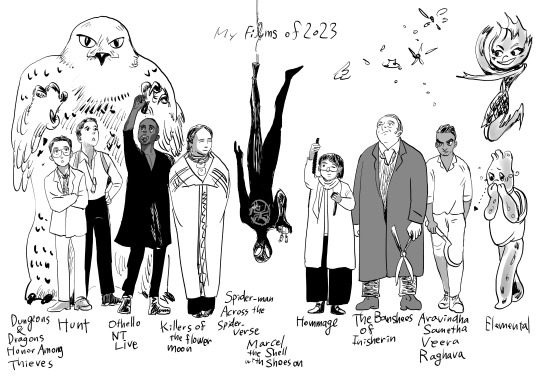
順不同
マルセル 靴をはいた小さな貝(Marcel the Shell with Shoes On)
マイ・エレメント(Elemental)
National Theatre Live: Othello
キラーズ・オブ・ザ・フラワームーン (Killers of the Flower Moon)
イニシェリン島の精霊(The Banshees of Inisherin)
ダンジョンズ&ドラゴンズ/アウトローたちの誇り(Dungeons & Dragons:Honor Amang Thieves)
アラヴィンダとヴィーラ(Aravindha Sametha Veera Raghava )
オマージュ(Hommage)
スパイダーマン:アクロス・ザ・スパイダーバース(Spider-Man: Across the Spider-Verse)
ハント(Hunt)
4 notes
·
View notes
Text
a small collection of live chat comments from the othello production that was livestreamed tonight from the national theatre
just ones i found funny, especially as someone who was watching the play for the first time







6 notes
·
View notes
Text
Daniel Craig & Stephen Colbert
NJ's Montclair Film Festival is proud to honor Daniel Craig with its 2022 Tribute! Stephen Colbert will host Mr. Craig on stage at the New Jersey Performing Arts Center (NJPAC) in downtown Newark, NJ on Friday, October 28, 2022, at 8:00 PM!

Daniel Craig is hailed as one of the finest actors of his generation on stage, screen, and television. Last year Craig returned for his fifth and final turn as ‘Bond’ in NO TIME TO DIE. The film was nominated for Outstanding British Film of the Year at the 2022 BAFTA Film Awards and won the Academy Award® for Original Song.
In 2019 Craig was seen in Rian Johnson’s hugely successful film, KNIVES OUT. A whodunit contemporary murder mystery, Daniel starred as ‘Benoit Blanc’ alongside Jamie Lee Curtis, Michael Shannon, Chris Evans, and Toni Colette. Craig’s standout performance earned him a Golden Globe Award nomination. He reprises his role for the sequel – GLASS ONION: A KNIVES OUT MYSTERY – alongside a stellar cast including Kathryn Hahn, Dave Bautista, Edward Norton, Kate Hudson, and Jessica Henwick.
Ticket information https://montclairfilm.org/events/an-evening-with-daniel-craig-stephen-colbert/
This event is the major fundraiser for Montclair Film.
2018 saw Daniel star as ‘Obie Hardison’ in KINGS with Halle Berry and Rick Ravanello. Set in the violent aftermath of Rodney King’s trial in 1992, the story follows a foster family in South Central and the implications the verdict has on their lives. Prior to this, Daniel was seen in Steven Soderbergh’s LOGAN LUCKY as ‘Joe Bang’ alongside Adam Driver, Channing Tatum, and Sebastian Stan. The story concerns two brothers who attempt to pull off a heist during a NASCAR race in North Carolina.
2015 saw Daniel star in the eagerly anticipated SPECTRE. Craig was seen returning as ‘James Bond’ for the third time, in the critically acclaimed box office smash SKYFALL. He has also starred as ‘Bond’ in QUANTUM OF SOLACE and CASINO ROYALE. In 2011 Craig starred in THE GIRL WITH THE DRAGON TATTOO directed by David Fincher, he played the lead character Mikael Blomkvist opposite Rooney Mara. Craig’s earlier film credits include LOVE AND RAGE, OBSESSION, THE POWER OF ONE, ROAD TO PERDITION, LAYER CAKE, INFAMOUS and Steven Spielberg’s Oscar®-nominated film MUNICH.
Craig is also an accomplished stage actor and in 2013 starred in the critically acclaimed Broadway show BETRAYAL in which he starred opposite Rafe Spall and Rachel Weisz. Directed by Mike Nichols, the play ran for 14 weeks and grossed $17.5million in that time. Daniel’s most recent theatre venture was the off- Broadway production of OTHELLO alongside David Oyelowo and directed by Sam Gold, at the New York Theatre in the autumn of 2016. In 2009 Daniel starred in a twelve-week Broadway run of A STEADY RAIN. Craig played opposite Hugh Jackman in this contemporary American play. Craig’s other theatre credits include leading roles in HURLYBURLY with the Peter Hall Company at the Old Vic, ANGELS IN AMERICA at The National Theatre and A NUMBER at the Royal Court alongside Michael Gambon.
2 notes
·
View notes
Note
2013
kind of embarrassing answer but it's the wolf of wall street...i watched it when i was 16 and had never seen a scorsese film before or more than a handful of r-rated movies, tbh and it totally blew the top of my head off. i didn't know movies could do that. i didn't know they were allowed!! haven't rewatched twows in years, so idk how it would hold up now that i'm 26 and have seen a lot of films. but i still maintain that the last five minutes are some of the best in cinema history.
honorable mention to the filmed version of national theatre live's production of othello (starring adrian lester and rory kinnear) which is not "A Movie" but is THE definitive othello in my humble opinion
0 notes
Text
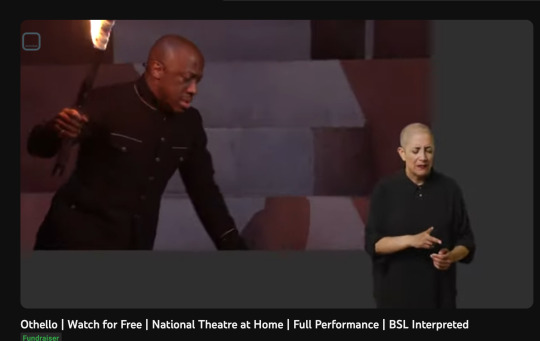
National Theatre at Home - Othello - BSL Interpreted
starring Giles Terera (Hamilton), Rosy McEwen (The Alienist) and Paul Hilton (The Inheritance). Filmed at the Lyttleton stage and directed by Clint Dyer.
Unfortunately they neglected to credit the Interpreter as well.
Live right now. Don't know how long the link will work, and whether they will take it down or not, so watch it ASAP!
Donate if possible to the National Theatre.
Captions are available, as are Audio-described and non-signed versions.
They're taking it down on Sunday! So watch it now if you can!
#national theatre at home#othello#shakespeare#bsl interpreted plays#giles terera#rosy mcewen#paul hilton#clint dyer#captioned performance#signed performance#BSL#national theatre#sign language#signed plays#theatre#signed theatre#shakespeare othello
0 notes
Text
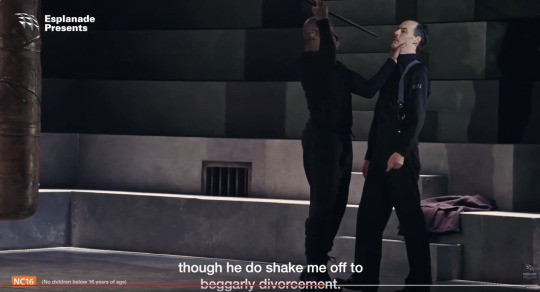

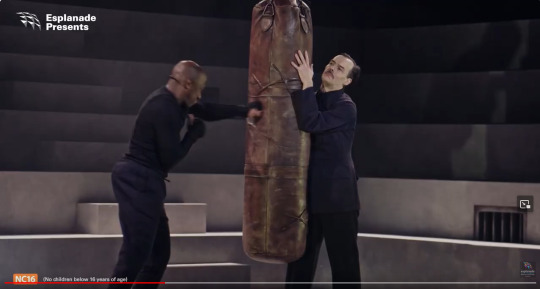
this looks like very powerful homoeroticism. i think i'm gonna enjoy it very much <3
National Theatre Live Othello 2023 trailer
#othello#iago#i could watch as many different stagings of this as there will ever be <3#othello 2023#Giles Terera#Paul Hilton
1 note
·
View note
Photo
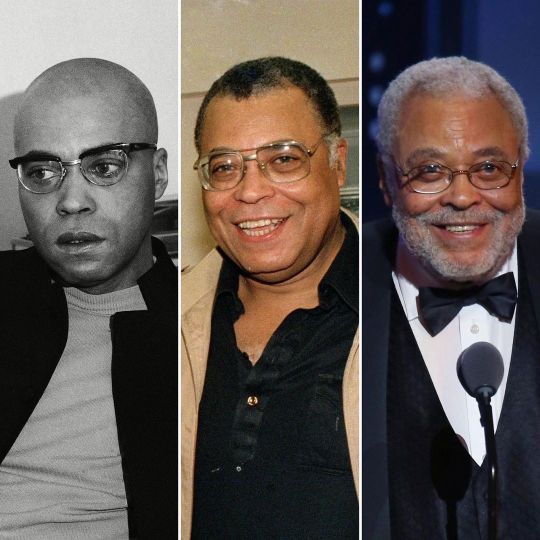
James Earl Jones (born January 17, 1931) is an actor whose career spans more than seven decades. He has been described as "one of the most distinguished and versatile" actors for his performances in film, theater, and television, and "one of the greatest actors in history". He has been said to possess "one of the best-known voices in show business, a stirring basso profondo that has lent gravel and gravitas" to his projects, including live-action acting, voice acting, and commercial voice-overs. A pre-med major in college, he served in the Army during the Korean War. He has performed in several Shakespeare plays including Othello, Hamlet, Coriolanus, and King Lear. He made his screen debut in Dr. Strangelove. He won his first Tony Award for The Great White Hope, which he reprised in the film earning him Academy Award and Golden Globe nominations. He starred in Claudine, he received a Golden Globe nomination. He won his second Tony Award for Fences. He became well-known as the voice of Darth Vader in the Star Wars film trilogy. He appeared in several successful films, including Conan the Barbarian, Matewan, Coming to America, Field of Dreams, The Hunt for Red October, The Sandlot, and The Lion King. He starred alongside in Gore Vidal's The Best Man, and an Australian tour of Driving Miss Daisy. He appeared in You Can't Take it With You and in The Gin Game. He reprised several of his roles in the Star Wars prequels Revenge of the Sith and Rogue One, an offscreen voice cameo as Darth Vader in The Rise of Skywalker, the remake of The Lion King, and Coming 2 America. He has won three Tony Awards, two Primetime Emmy Awards, and a Grammy Award. He was inducted into the American Theater Hall of Fame. He was presented with the National Medal of the Arts by President Bush. He received the Kennedy Center Honor. He was invited by President Barack Obama to perform Shakespeare at the White House Evening. He received the SAG Life Achievement Award. He received an Honorary Academy Award. He received an Honorary Doctor of Arts degree from Harvard University. He was honored with a Special Tony Award for Lifetime Achievement in the Theatre. #africanhistory365 #africanexcellence https://www.instagram.com/p/CnhEolALqSI/?igshid=NGJjMDIxMWI=
0 notes
